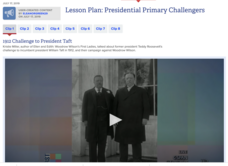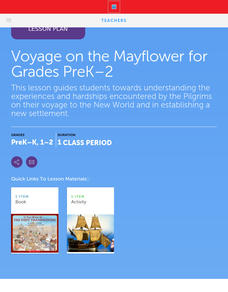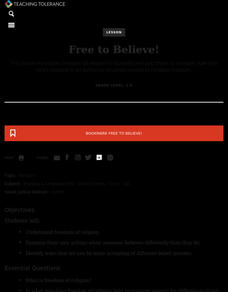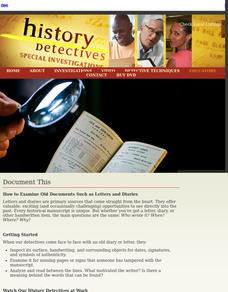K20 LEARN
Blue or Gray? Perspectives on the Civil War
Using primary and secondary sources, such as letters and diaries from soldiers and civilians, learners consider why people fought in the American Civil War. A role-playing Historical Mingle activity, as well as discussion questions and...
Constitutional Rights Foundation
270 Votes to Win: The Electoral College in the United States
What exactly is the Electoral College and how does it work? The lesson is part of a larger series on government that explains what the Electoral College is and how it helps determine an election winner. Academics participate in...
Encyclopedia Britannica
Campaign Photo Analysis
It's the art of the image! As part of a study of the 2020 Presidential race, groups analyze an image of a candidate, first from an objective point of view and then subjectively. They then prepare a presentation detailing what they...
Encyclopedia Britannica
Do the Campaign Math
Follow the money trail! As part of their study of the 2020 Presidential campaign, class members to research how much money candidates have raise and spent, as well as the sources of the funds. They then graph their findings to compare...
Encyclopedia Britannica
Presidential Qualifications
Can anyone grow up to be president of the United States? As part of their study of the 2020 election, groups research the constitutional requirements to become president. The class then brainstorms a list of qualifications beyond those...
Encyclopedia Britannica
Election Issue Comparison Chart
As part of a study of the issues raised in the 2020 presidential election campaign, class members investigate and then create a pro-con comparison chart that reveals each candidate's position on a variety of issues.
American Museum of Natural History
What Do You Know About Archaeology?
A 10-question interactive permits young anthropologists to study the field of archaeology and the tools archaeologists use to dig into history.
National Endowment for the Humanities
A Day for the Constitution
The "Constitution Day and Citizenship Day" law requires schools receiving any federal funding to provide educational programming on the history of the American Constitution. The lesson plans, materials, videos, questions, and activities...
National Woman's History Museum
From the Declaration of Independence to the Declaration of Sentiments
As part of a study of women's rights in early America, class members compare the Declaration of Independence to the Declaration of Sentiments presented at the Seneca Falls Convention. As an exit ticket, individuals explain whether or not...
University of Wisconsin
We're Off to India!
Pack your bags and set off to the wonderful country of India in a multi-day cultural unit. The lesson is a 17-day series focusing on literature, music, art, geography, and the culture of India. Scholars complete several activities,...
Midland Independent School District
Celebrating National Holidays
There's more to holidays than just days off! Young historians explore the meaning behind national holidays in a five-part lesson plan. They focus on what holidays are and why they are celebrated, as well as learn the meaning of music in...
Facing History and Ourselves
A Contested History
Memories of and interpretations of history change—that's the key takeaway from a lesson that has young historians compare the story of the Reconstruction Era as told by the historians of the Dunning School to the view of scholars today...
C-SPAN
Presidential Primary Challengers
A formidable opponent can shake up the election of an incumbent president. Class members explore the results of the elections of 1912, 1968, 1976, 1980 and 1992 using video clips. A chart helps pupils organize their thoughts and analysis.
Facing History and Ourselves
Literature and Imagination Make Democracy Work
The final lesson in the "What Makes Democracy Work?" series examines the connections between imagination, literature, and democracy. Class members listen to a podcast, read an excerpt from Azar Nafisi's, The Republic of Imagination, and...
Scholastic
Voyage on the Mayflower
After completing an online activity about the Mayflower, scholars draw a picture about what they know of the Thanksgiving holiday, including a one-sentence summary. A reading of If You Were at the First Thanksgiving by Anne Kamma is the...
Teaching Tolerance
Free to Believe!
The United States: One nation with countless religions. An interesting lesson focuses on the freedom of religion protected under the First Amendment. Academics learn why it is important to protect all religions, why there is a separation...
Scholastic
The First Thanksgiving Feast for Grades 6–8
It's time for the feast! Young historians complete their study of the First Thanksgiving by completing an online activity, watching a slideshow, and examining a First Thanksgiving timeline. After answering text-dependent questions to...
Scholastic
Voyage on the Mayflower for Grades 6–8
Imagine living in the hold of a sailing ship for 63 days, enduring rough seas and autumn storms. As part of a study of the voyage of the Mayflower, class members examine an online resource that details life about the ship, watch a slide...
PBS
Document This
Being a historian requires serious sleuthing. They examine primary source documents and look for evidence, for clues that reveal who wrote the document, when, and why. After watching two historians model the process, young history...
DocsTeach
The Civil War as Photographed by Mathew Brady
While there are no photographs of actual battles during the Civil War, the pictures of Matthew Brady still paint a vivid image of what life was like as a solider. Using a series of photographs, including those of camp life and the...
US House of Representatives
Black Americans in Congress Speak Their Mind
To conclude their study of Black Americans in Congress, groups select a statement made by one of the Members, examine the Member's profile on the provided link, and create a display that includes state represented, years of service, an...
Japan Society
Japan in the World Since 1945
What have US-Japanese relations been like since the conclusion of World War II? Why do some commentators identify Japan's postwar years as a subordinate independence? Invite your young historians to research Japan's status in the world...
Scholastic
Perfect Postcards: Illinois
Connect the geography and history of Illinois using an art-centered lesson on the railroads. The railroad connected once-distant places, particularly in the Midwest. Using research, class members create postcards of fictional cross-state...
Media Education Lab
Understanding Viral Messages
Imagine advertising for a product but not being paid to do so. Welcome to the world of Viral Messaging. Class members first view a T-Mobile flash mob video that went viral and has been seen by over 14 million viewers. After analyzing the...
Other popular searches
- Social Skills Lesson Plans
- Autism Social Skills
- Personal Space Social Skills
- Social Skills for Teens
- Current Events Social Skills
- Social Skills Adolescents
- Social Skills Lessons
- Social Skills Games
- Team Building Social Skills
- Circle Time Social Skills
- Teaching Social Skills
- Cooperation Social Skills

























